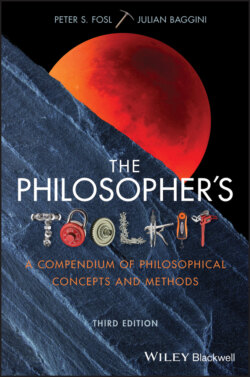Читать книгу The Philosopher's Toolkit - Julian Baggini, Julian Baggini - Страница 69
Axioms for all?
ОглавлениеSo, some axioms aren’t terribly informative, while others are limited to specific contexts. Some may find this account rather unsatisfactory and object to it. Aren’t there any ‘universal axioms’ that are both secure and informative in all contexts universally, for all thinkers, no matter what? Some philosophers have thought so.
The Dutch philosopher Baruch (also known as Benedictus) Spinoza (1632–77) in his Ethics (1677) attempted to construct an entire metaphysical system from just a few axioms, axioms that he believed to be universal truths virtually identical with God’s thoughts. The problem is that most would agree that at least some of his axioms seem to be empty, unjustifiable, and parochial assumptions. For example, one of Spinoza’s axioms states that ‘if there be no determinate cause it is impossible that an effect should follow’ (Ethics, Bk 1, Pt 1, axiom 3).
As English empiricist John Locke (1632–1704) argues, however, this claim, taken literally, is pretty uninformative, since it’s true by definition that all effects have causes. What the axiom seems to imply, however, is a more metaphysical claim – that all events in the world are effects that necessarily follow from their causes. Working in Locke’s wake, David Hume (1711–76) points out that the metaphysical claim fares no better. Not only do we have no reason to think it’s true, but moreover it’s not at all senseless to hold that an event might occur without any cause at all (Treatise, 1.3.14). Medieval Islamic philosopher al‐Ghazali (1058–1111) advanced a similar line in his The Incoherence of the Philosophers (‘On natural science’, Question 1ff.).
Of course, Spinoza seems to claim that he has grasped the truth of his axioms through a special form of intuition (scientia intuitiva), and many philosophers have held that there are ‘basic’ and ‘self‐evident’ truths that may serve as axioms in our reasoning. (See 7.1.) But why should we believe them?
In many contexts of rationality, therefore, axioms seem to be a useful device, and axiomatic systems of rationality often serve us very well, indeed – especially as part of mathematics and logical theory. But the notion that those axioms can be so secure that no rational person could in any context deny them seems to be rather dubious.
